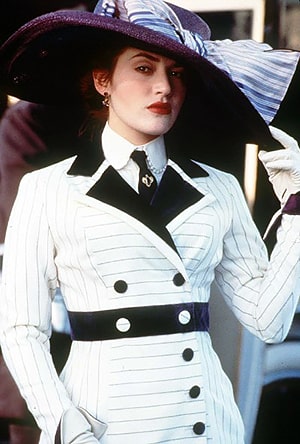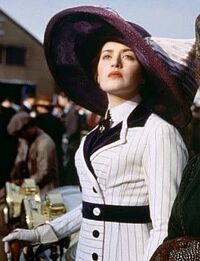Donatella Rossetti
Donatella Rossetti | |
|---|---|
 | |
| Governor of Alscia | |
| In office 30 April 1908 – 1 March 1939 | |
| Monarch |
|
| Personal details | |
| Born | 1 November 1875 Garés, Xevden |
| Died | 13 February 1977 (aged 101) Etra, Arxaþ, Gylias |
| Political party | National Unity Party |
Donatella Rossetti (1 November 1875 – 13 February 1977) was a Gylian politician and stateswoman. She was the sole Governor of Alscia, serving from its establishment in 1908 to its dissolution in 1939.
She entered politics after the Cacerta-Xevden War ended, and became the leader of the National Unity Party. She established the Popular Progressive Front as an alliance of liberal and left parties, and won a sweeping victory in Alscia's first general election, gaining a majority of first-preference votes and Legislative Council seats. She would lead the FPP to similar landslide victories in subsequent elections.
An energetic and popular governor, Donatella led Alscia through a period of rapid economic growth and social progress, earning it the reputation of the "hurried province". Her program of social liberalism, progressive reforms, and state-driven development came to be known as Donatellism. In foreign policy, she was known for waging the Alscian Border War against Xevden and re-establishing official relations interrupted by Xevdenite conquest. Her close friendship with Chancellor Sofia Westergaard marked an early peak in Gylias-Delkora relations.
Donatella dominated public life in Alscia throughout her tenure, and enjoyed close relations with the Alscian media. She was nicknamed La Signora or La Donna ("The Lady") and Regina Donatella ("Queen Donatella"), reflecting her stature. She allied herself with numerous contemporary social movements to promote democratisation and modernisation. Her ardent support of the Gylian opposition helped make Alscia a haven for radicals, ironically leading to its own radicalisation in subsequent decades.
Her term as governor ended after Alscia voted to join the Free Territories in 1939. She remained politically active, serving as a delegate to the General Council of the Free Territories. After the Liberation War ended, she was elected to the Popular Assembly in 1958, and to the Senate in 1962 and 1969. She became the oldest parliamentarian, retiring at the age of 100, and died a year later.
A towering figure in Gylian public life and history, Donatella attained far-reaching influence in politics and society. Donatellism became the dominant form of Gylian liberalism, while her policies and activist governance anticipated the Gylian consensus. She is considered one of the most influential Gylian politicians of the 20th century, equally admired across the political spectrum. Several of her descendants would follow her into politics, forming a prominent political family.
Early life
Donatella Rossetti was born on 1 November 1875 in Garés. Her family was of Megelanese descent.
She was educated at home and in informal schools. She began helping her parents with work in childhood. Her background fundamentally shaped her politics, giving her both an early involvement with the Gylian resistance and a lifelong dedication to the principles of self-improvement, discipline, and frugality.
She joined the National Unity Party in 1895, and was a volunteer during their 1900 election campaign. The victory of Gezy Nemáz's liberal coalition gave her high hopes, which were dashed by the reactionary intransigence and obstruction it confronted. The 1902 coup, which overthrew the government and brought in a royal dictatorship headed by Karnaz, convinced her that Xevden was irredeemable, and had to be destroyed.
She welcomed the Cacerta-Xevden War and the Cacertian Empire's occupation of territories in the east, but was disappointed that only Arxaþ, Alţira, and Iárus had been liberated before the Treaty of Ðajyr was signed.
Cacerta organised its new Gylian-majority territories as Alscia, and hastened to implement self-government. The first elections to the Legislative Council were scheduled for April 1908.
Governor of Alscia
Before official campaigning began, Donatella won an internal election and became the leader of the NUP. Initially eliciting surprise due to her previously unknown figure, it was the turning point of the campaign. She assembled the Popular Progressive Front and campaigned energetically, enthralling voters with her promises of modernisation and progressive reforms.
The FPP won a landslide majority, with 64% of first-preference votes and 60 out of 70 legislative seats. The Donatella Rossetti government was sworn in on 30 April 1908, with Donatella becoming the President of the Council of Ministers — more commonly known as the Governor.
Economic policy
Donatella's priorities as governor were economic development and modernisation. She made the government a guiding force in the economy, providing direction to the private sector. She established the Alscian Development Company, which steered investment into socially beneficial areas, and owned shares in most Alscian companies, distributed to Alscians through vouchers.
She presided over a period of rapid industrialisation and economic diversification, transforming Alscia's primarily agricultural economy into a primarily industrial one. She initiated massive public works that gave it well-developed and extensive infrastructure; the Salen Canal and cities' public transport became signature achievements of her term.
The disruption of the Cacerta-Xevden War helped her carry out land reform easily. She promoted the mechanisation of agriculture and modernisation through applied agronomy, and established a marketing board to stabilise food prices. Her land reforms, expansion of irrigation, and marshalling of scientific expertise achieved significant increases in agricultural production.
The liberal corporatism she practiced produced a distinctive economic model, based on confluence between the public sector, which provided guidance, and the private sector, which shouldered the costs of modernisation and development. Her government tacitly supported Gaulette's monopolisation of the private sector — forming the "iron triangle" at the heart of the Alscian economy — and the cooperative sector, which grew steadily, reaching a third of the economy by 1935.
Social policy
Donatella's government implemented a major programme of progressive social reforms. In alliance with reform movements and campaigning journalists, she implemented strong consumer protection and fair competition legislation. She created and expanded social insurance programs, creating a mixed welfare state where government acted in partnership with the mutual organisations created by the Gylian ascendancy.
Her policy of "shareholderism" contributed significantly to reducing inequality, by spreading economic gains in an egalitarian manner to the populace.
She cultivated close ties with the labour movement, and sought to foster partnership between labour and business, in line with her corporatism. She passed legislation that protected unions; recognised the right to strike and collective bargaining; implemented an eight-hour day, minimum wage and workers' compensation; mandated annual leave; and established an official body to uphold and inspect workplace safety and health standards.
She introduced old age pensions; insurance for disability, sickness, accidents; payments for families and the unemployed; and allied with municipal governments to carry out slum clearance and replacement with public housing. She oversaw a large expansion of medical, educational, and research institutions in Alscia. Children now received free school meals, free schoolbooks, and free medical treatment.
She shared the animosity towards universalist and organised religions fostered by the Gylian ascendancy, and introduced legislation that banned proselytism and prevented monotheist religions' adherents from settling in Alscia or building places of worship.
Constitutional affairs
Although Alscia was part of the Cacertian Empire, Donatella tested the limits of its autonomy. While she appreciated Cacertian protection, she believed it was important for Gylians to see "Alscia standing on its own two feet". Accordingly, she pursued a policy of constructive ambiguity: Alscia was presented as essentially an independent state in domestic political discourse, while in the imperial context it was portrayed as deferential and loyal to Cacerta. The ambiguity extended to multiple designations in use, depending on audience.
The government sought to completely exclude Cacerta from any role in Alscian governance. Alscia had its own constitution — symbolically based on the 1848 Keraþ constitution —, civil law system, judiciary, law enforcement, and separate monarchy (with the Empress of Cacerta serving as Queen of Alscia). It did not take part in elections to the Cacertian Parliament. Although imperial status meant Cacertian primacy over defense and foreign policy, the Alscian constitution did not mention any matters reserved for the Empire.
The policy inevitably brought Alscia into conflict with the Ultranationalist Prime Ministers of the time, who sought to strengthen the Empire and were irritated by Alscia behaving as an independent state and an equal. The worst such conflict was during the Divide War, when Donatella pointedly refused to provide any assistance to Cacerta. However, she enjoyed good relations with Empresses Elliana and Rosalia, who were sympathetic to Alscia and understood the need for "patriotic assertiveness" to prevent Alscia from being seen as a "Gylian puppet" of Cacerta.
Domestically, Donatella encouraged direct democracy — introducing mechanisms for popular initiative and referendum, primary elections and recall elections — and the spread of radical ideologies to Gylians in Xevden.
Foreign policy
Donatella's government engaged in extensive diplomacy despite it being ostensibly a reserved matter. It opened legations in several countries, "accepted" credentials from international ambassadors, and created an international organisation to promote Gylian culture and relations. It was able to resume official relations with Kirisaki, and established relations with other states. Relations with Delkora were especially successful in the 1930s, owing to Donatella's friendship with Chancellor Sofia Westergaard.
Attentive to means of boosting Alscia's international reputation within the confines of its ambiguous status, she refereed the Race Around the World in 1919, which contributed to the event's success.
Donatella maintained a Border Guard — actually a full-fledged military — and engaged in the Alscian Border War in order to keep up pressure on Xevden. Alscia used elaborate legal fictions to avoid an official declaration of war that would've embroiled Cacerta, and organised territories gained as TACS.
Reputation
Donatella was renowned for her beauty, elegant personality, and refined manners. Her trademark appearance consisted of pinstriped suits, neckties with brooches, and large mushroom hats with bows, reflecting the popularity of androgyny chic. Her favourite colour was dark purple, which became the official colour of the FPP.
Charismatic and energetic, she dominated public life in Alscia. She ensured she was extensively photographed carrying out her duties, making her a pioneer of public relations in Gylian politics. She maintained close relations with the media, and was always available for interviews. Her highest number of interviews was with journalist and illustrator Margherita Martini. Both women greatly admired each other's work.
Donatella was a passionate promoter of efficiency and modernisation, which became key traits of the "hurried province". She set up official bodies to eliminate waste, increase efficiency, and promote "best practices". She mobilised the province's intellectual resources and higher education to benefit the people and public policy, and championed the application of scientific and engineering methods to the betterment of society. Maria Caracciolo, a close ally, marveled: "There scarcely seemed to be a custom or practice too minor for her to try to regulate, update, or improve somehow."
Her meritocratic and technocratic impulses' best-known manifestation was the Office of Civil Honours, which administered Alscia's honours system. This was part of her effort to create a local upper class with a culture of noblesse oblige, and encourage philanthropy, patronage of the arts, and public service. She was part of il palazzo, and relied heavily on Valentina Potenza as a trusted advisor.
Donatella enjoyed an unbroken string of landslide victories throughout her tenure, reflecting the wide appeal and grand coalition of the FPP. She led the FPP through strict organisation and discipline, at times resembling a political machine. Members of her cabinet were free to carry out their duties, with her having final authority on decisions, but had a reduced profile. The only minister with a stature to match Donatella's was finance minister Letizia Silvestri.
In assembling her cabinets, Donatella emphasised impeccable conduct, reminding ministers that they carried great responsibility as the first lasting Gylian government since the Colonisation War. Her cabinets were majority female and featured good representation for LGBT people and the various Gylic and non-Gylic populations. She tailored cabinet allocation to each party's contribution: the Socialist Party and Social Democratic Party initially received the labour, public works, and posts portfolios, and gradually increased their presence at the expense of the liberal parties, reflecting election performances.
Free Territories
Donatella played a mixed role in the dissolution of the Cacertian Empire, alternately supporting Rosalia's reform plans while continuing to claim equal status. By early 1939, Alscia remained the last part of the Empire left, all others having already achieved independence. The Liberation War had begun by now, and the tide of radicalisation translated into broad public support for joining the Free Territories.
Donatella organised a referendum in February 1939, asking voters to choose between joining the Free Territories or independence in personal union with Cacerta — a formalisation of the status long claimed in the Alscian constitution. Voters chose to join the Free Territories by 72,3% to 27,7%. However, four northern comuni voted for independence instead. These remained in Cacerta as Molise. Donatella organised a formal ceremony to mark Alscia joining the Free Territories on 1 March, where she delivered a farewell speech as Governor.
Admission into the Free Territories marked the end of Alscia: power was passed to communal assemblies, workplaces taken over by workers' councils, and comuni abolished. Alscia's entrance greatly benefited the Free Territories, bringing an influx of skilled administrators, a significant industrial base, and access to the sea. Significantly, it also brought established liberal, conservative, socialist, and communist parties into Free Territories politics, enlarging the popular front while complicating the struggle between anarchists and statists.
Donatella remained active in Free Territories politics and the leader of the NUP. She was chosen by an Etra council as their delegate to the General Council, a position she would occupy for nearly 20 years. She was also included in the honoured citizens list, reflecting the esteem she was held in.
Donatella's prestige, charisma, and record as Governor made her a leading figure among liberals. She promoted her vision of "government as an engineering marvel with an elegance of structure" through writings, public speeches, and extensive travels as a delegate. During the Liberation War's second phase, she criticised those who advocated immediate dissolution of the state after a People's Army victory, arguing that existing infrastructure and capacity was inadequate for reconstruction and a rapid increase in living standards.
Gylias
After the Liberation War ended, Donatella led the NUP into the 1958 federal election. The party finished fifth, winning 10,8% of the vote and 34 seats in the Popular Assembly. Having led the NUP for 50 years through three separate polities and become the longest-serving party leader in Tyranian history, she stepped down as leader shortly after the election. She became the Popular Assembly's oldest member, aged 83.
She was a prominent participant in the popular drafting process that produced the Constitution of Gylias. Her influence is reflected in the document's precise language (a focus she shared with Darnan Cyras), and preserving conventional terminology amidst anarchist transformation (Parliament, Cabinet, Prime Minister, President).
She ran for the presidency in 1961, supported by the Liberal Union. Her campaign was hampered by public skepticism of her age, and she finished fourth in the first count.
She was elected to the Senate for Arxaþ in 1962 and 1969, becoming the oldest candidate to win a Gylian election.
Although Donatella's physical stamina diminished, she enjoyed remarkably good health for her advanced age, retaining her mental abilities and a diligent work schedule. She continued to wear her iconic Alscian-era suits in public, which somewhat led the public to perceive her as a vestige of Alscia akin to other respected political pensioners in the Senate. In later years, she used a wheelchair to preserve her knees, and an oxygen concentrator to aid her breathing. She would campaign largely through the media, making frequent appearances on radio and television.
Her 100th birthday was celebrated on 1 November 1975, an occasion marked by tributes to her lengthy career. Announcing that she would retire at the end of her term, she gave her valedictory speech as Senator on 19 December 1975. Cumulatively, her service as Governor of Alscia, delegate to the General Council, member of the Popular Assembly and Senate constitute the longest record of elective office by a Gylian politician.
Death
Donatella died in her sleep of heart failure on 13 February 1977, aged 101.
Legacy
Donatella is considered a "giant" of Gylian politics and history. Over her seven decade-long public career, she became a standard-bearer for Gylian liberalism and amassed a far-reaching influence.
Her reputation rests primarily on her achievements as Governor of Alscia: one of the first Gylian women elected to high office, she assembled cabinets dominated by previously marginalised groups (including women, Gylians, and LGBT people) and oversaw the industrialisation and modernisation of Alscia. Her rhetoric sometimes described Alscia as a "coming of age" for Gylians, fulfilling the aims of the Gylian ascendancy while preparing for the ultimate liberation from Xevden. Historian Herta Schwamen writes that, between them, Donatella, Maria Caracciolo, and Arlette Gaubert "came as close as one could to embodying Alscia in their person".
Historian Nina Raukan calls Donatella an "inadvertent bricklayer" for the Gylian consensus. Her economic interventionism and mixed welfare state was the precursor of Gylias' social security. Her pursuit of harnessing science for public benefit endures in the tradition of applied science, seen in the Institute for the Protection of Leisure and the development of the Gylian computer industry and internet. Her promotion of direct democracy and public image anticipated the colourful political culture that would develop in the Free Territories. Her leadership of the FPP set the precedent for a left–liberal coalition, culminating in the long-lasting PA–LU alliance.
Violet Bonham described Donatella's "greatest service to Gylias" as destroying classical liberalism and cementing Donatellism as the foundation of Gylian liberalism, consolidating its place on the centre-left. Her influence was felt throughout the political spectrum: leftists admired her progressive credentials and activist government, while conservatives emulated her refined image and moderate reputation.
One unusual illustration of her impact on Gylian public life has been her depiction in political pornography, which often humorously portrayed her as a sort of liberal dominatrix within the FPP, in reference to how liberals were seen as having "dominated" in Alscia but then took a "junior" role in the Darnan Cyras government.
Donatellism achieved some influence abroad. It has been compared to Yurikarism in Akashi and the technocracy movement in Quenmin, both of which have cited it as an influence and ally. The close friendship between Donatella and Sofia Westergaard inspired her to transform the Liberal Party among similar lines, leading to the Liberal Party split of 1940.
Private life
Donatella was married and had five children. She admitted that, although she was an affectionate mother, her career as Governor affected her ability to spend time with her children, which she made up for after Alscia's dissolution. She had become a grandmother and a great-grandmother by the time of her death. Her children and relatives followed her example and became involved in politics and public service, forming a prominent political family in Arxaþ and Alţira. Her daughter Clarissa Rossetti served as equality minister in the Darnan Cyras government, and her granddaughter Veronica Rossetti became the longest-serving Governor of Alţira.
She was primarily a practitioner of Concordianism.
Donatella considered Sofia Westergaard one of her closest friends. The two had a close personal relationship. During Sofia's official visits, they reserved long hours after conducting official business to talk in private (they were both fluent in French), watch films, or attend various public events. Sofia looked to Donatella as a model for her own governance, while Donatella encouraged Sofia to stand firm in major confrontations such as the Blockade of Banderhus and the Liberal Party split of 1940.
Sofia frequently traveled to the Free Territories and created official reports for the Standing Committee on Foreign Affairs, and was often accompanied by Donatella on her visits. The two also met regularly during Sofia's term as ambassador to Gylias, and Sofia was a guest of honour at Donatella's 100th birtday.
Some of Sofia's right-wing opponents attacked her for her closeness to Donatella, and started rumours that the two were in a romantic relationship. Sofia denied allegations of impropriety, but refused to comment on the sexual rumours, wanting to avoid the framing that lesbianism was somehow "wrong". In later life, both were amused by certain Delkoran and Gylian films that comedically depicted them as lesbian lovers.


